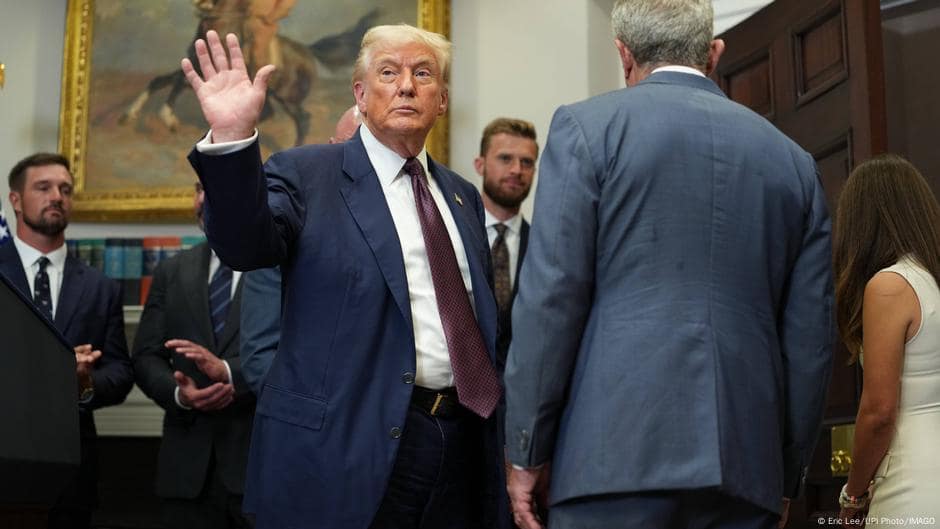Global Markets React to New US Tariff Measures
The global market has experienced significant volatility following the announcement of new tariffs by the United States, with several trade allies expressing shock and concern. President Donald Trump has imposed steep tariffs on a range of countries, including Canada, India, and Switzerland, leading to a sharp decline in stock markets. The U.S. stock market opened lower, reflecting the negative sentiment from both European and Asian markets.
New tariffs are set to take effect on August 7, creating uncertainty among key trading partners who are hoping to reach trade deals before this deadline. The EU, for instance, has remained relatively quiet on the delay of the tariff start date, with no official comments from the European Commission or Trade Commissioner Maros Sefcovic. However, Sefcovic did mention that the new U.S. tariffs reflect the first results of the EU-U.S. deal, particularly the 15% all-inclusive tariff cap.
France’s Wine Industry Warns of ‘Brutal’ Impact
The French wine industry has raised concerns about the potential “brutal” impact of these tariffs. The current trade deal between the U.S. and the EU applies a 15% tariff on wines and spirits from France. Gabriel Picard, president of the French wine and spirits exporters’ federation FEVS, warned that the impact could be severe, especially given the decline of the U.S. dollar. He estimated that this could lead to a 25 percent reduction in sales, representing a loss of €1 billion.
Jean-Marie Fabre, president of the union of independent winegrowers of France, expressed hope that the industry could be granted an exemption. While major wine-producing countries like France and Italy are pushing for zero tariffs on alcohol, including champagne, these talks are still ongoing.
Kosovo Removes Tariffs on U.S. Goods
In contrast, Kosovo has taken a different approach by removing trade tariffs on U.S. products imported into the country. Prime Minister Albin Kurti expressed gratitude for the enduring relationship with the United States, stating that Kosovo welcomes American products to its market. This move is expected to boost trade exchange and increase investments.
Public opinion in Kosovo has been strongly pro-American since a 1999 U.S.-led NATO air campaign that ended the Serbian crackdown on ethnic Albanians, paving the way for Kosovo’s independence.
U.S. Markets See Sharp Decline
U.S. markets reacted sharply to the new tariffs, with the Dow Jones Industrial Average falling 633.77 points, the S&P 500 losing 107.59 points, and the Nasdaq Composite dropping 483.70 points. The CBOE Volatility Index also rose significantly, indicating heightened investor anxiety.
Worries about a weakening U.S. economy were further reinforced by a report showing lower-than-expected job growth, with only 73,000 jobs added last month compared to the forecasted 115,000.
Switzerland Seeks Negotiated Solution
Switzerland has expressed disappointment over the higher U.S. tariff rate of 39%, which is higher than the 31% previously threatened. Swiss officials believe this will negatively affect key industries, particularly the pharmaceutical sector, which constitutes a large portion of exports to the U.S.
Trump Urges Fed to Lower Interest Rates
President Trump has continued his criticism of the Federal Reserve, urging the board to “assume control” if Chair Jerome Powell does not lower interest rates. This comes after the Fed kept rates steady, with Powell emphasizing the need for more data before making any decisions.
India Engages in Trade Talks
India is engaged in trade talks with the U.S. to avoid a 25% tariff on Indian exports. A U.S. delegation is expected in New Delhi later this month. Analysts warn that these tariffs could hit $40 billion in Indian exports and strain ties with a key U.S. ally in Asia.
European Shares Hit Four-Week Low
European stocks fell to a four-week low as investors reacted to the new U.S. tariffs. The pan-European STOXX 600 index dropped 1.3%, with Germany’s DAX and Denmark’s OMXC also posting sharp losses. Healthcare shares were particularly affected due to Trump’s call for pharmaceutical firms to cut drug prices.
South Africa Faces Tariff Challenges
South Africa is facing 30% tariffs on its U.S. exports after failing to secure a trade deal before the deadline. The country’s automotive industry, which employs 115,000 people, fears major job losses. South Africa is using the remaining time to negotiate a new deal with the U.S.
Malaysia Sees Reduced Tariffs
The Trump administration has decided to lower reciprocal tariffs on Malaysia from 25% to 19%, a positive outcome welcomed by the Malaysian government. This reflects the strong economic ties between the two nations.
India Likely to Cancel F-35 Jet Deal
India is likely to cancel its defense deal with the U.S. after the Trump administration’s decision to impose a 25% tariff on Indian exports. According to reports, India has informed the U.S. it is not keen to buy the F-35 stealth fighter jets.
Canada Expresses Disappointment
Canada has expressed disappointment over the new U.S. tariffs, which will heavily affect lumber, steel, aluminum, and automobiles. Canadian officials argue that the justification for the tariffs is weak, citing that Canada accounts for just 1% of U.S. fentanyl imports.
Japan Continues Talks on Auto Tariffs
Japan has welcomed the reduced reciprocal tariff rate of 15% but continues to seek reductions on auto exports, which currently face 25% tariffs. Japan remains hopeful that the U.S. will take measures to lower these duties.
Sri Lanka Pursues Trade Dialogue
Sri Lanka has confirmed its intention to continue trade dialogue with U.S. officials. The island nation remains optimistic about reaching a mutually beneficial agreement on tariffs.

